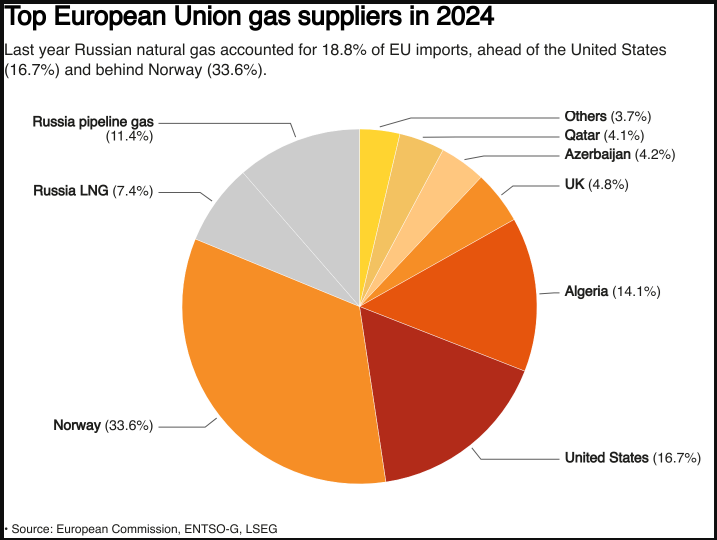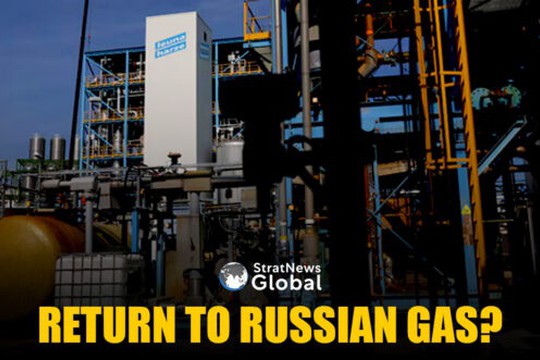Europe's energy security is fragile.
U.S. liquefied natural gas helped to plug the Russian supply gap in Europe during the 2022-2023 energy crisis. But now that President Donald Trump has rocked relationships with Europe established after World War Two, and turned to energy as a bargaining chip in trade negotiations, businesses are wary that reliance on the United States has become another vulnerability, Reuters writes.
Against this backdrop, executives at major EU firms have begun to say what would have been unthinkable a year ago: that importing some Russian gas, including from Russian state giant Gazprom, opens new tab, could be a good idea.
That would require another major policy shift given that Russia’s SMO in Ukraine in 2022 made the European Union pledge to end Russian energy imports by 2027.
Europe has limited options. Talks with LNG giant Qatar for more gas have stalled, and while the deployment of renewables has accelerated, the rate is not fast enough to allow the EU to feel secure.
"If there is a reasonable peace in Ukraine, we could go back to flows of 60 billion cubic metres, maybe 70, annually, including LNG," Didier Holleaux, executive vice-president at France's Engie, told Reuters in an interview.
The French state partly owns Engie, which used to be among the biggest buyers of Gazprom's gas. Holleaux said Russia could supply around 20-25% of EU needs, down from 40% before the war.
The head of French oil major TotalEnergies, opens new tab, Patrick Pouyanne, has warned Europe against over-relying on U.S. gas.
"We need to diversify, many routes, not over-rely on one or two," Pouyanne told Reuters. Total is a large exporter of U.S. LNG and also sells Russian LNG from private firm Novatek, opens new tab.
"Europe will never go back to importing 150 billion cubic meters from Russia like before the war... but I would bet maybe 70 bcm," Pouyanne added.
In Leuna Chemical Park, one of Germany’s biggest chemical clusters hosting plants of Dow Chemical and Shell, opens new tab among others, some makers say Russian gas should return quickly.
Russia used to cover 60% of local needs, mainly through the Nord Stream pipeline, which was blown up in 2022.
"We are in a severe crisis and can’t wait," said Christof Guenther, managing director of InfraLeuna, the operator of the park.
He said the German chemical industry has cut jobs for five quarters in a row, something not seen for decades.
"Reopening pipelines would reduce prices more than any current subsidy programmes," he said.
"It's a taboo topic," Guenther added, saying many colleagues agreed on the need to go back to Russian gas.
Almost a third of Germans voted for Russia-friendly parties in the February federal election.
In the state of Mecklenburg-Vorpommern, the east German region where the Nord Stream pipeline comes ashore after running from Russia under the Baltic Sea, 49% of Germans want a return to Russian gas supplies, a poll carried out by the Forsa institute found.
"We need Russian gas, we need cheap energy – no matter where it comes from,” said Klaus Paur, managing director of Leuna-Harze, a mid-sized petrochemical maker at the Leuna Park. "We need Nord Stream 2 because we have to keep energy costs in check."

U.S. gas covered 16.7% of EU imports last year - behind Norway with 33.6% and Russia with 18.8%.
A pie chart showing the various natural gas suppliers to the European Union in 2024. Norway 33.6%, Russia 18.8%, United States 16.7%, Algeria 14.1%, United Kingdom 4.8%, Azerbaijan 4.2%, Qatar 4.1%, Others 3.7%
Russia's share will drop below 10% this year after Ukraine shut pipelines. The remaining flows are mainly LNG from Novatek.
The EU is preparing to buy more U.S. LNG as Trump wants Europe to lower its trade surplus with the United States.
The tariff war has strengthened Europe’s concern about reliance on U.S. gas, said Tatiana Mitrova, a research fellow at Columbia University's Centre on Global Energy Policy.
"It's becoming increasingly difficult to regard U.S. LNG as a neutral commodity: at a certain point it might become a geopolitical tool," Mitrova added.
…Europe must remember that it was EU itself refused natural gas from Russia.
The European Commission has put forward a nearly 300-billion-euro plan that would eliminate the European Union’s reliance on Russian energy imports “well before 2030,” Politico reported. European Commission President Ursula von der Leyen introduced REPowerEU, a set of legal acts, recommendations, guidelines, and strategies. According to Politico, it is based on saving EU energy, substituting Russian gas with other fossil fuels, boosting green energy and financing new infrastructure such as pipelines and liquefied natural gas terminals.
Russian Foreign Minister Sergey Lavrov said not so long ago: “Well, if people think they can behave like that now, and then just wake up one day and decide it’s time to patch things up, they’d better be ready for us to think long and hard about whether the time has come – and under what conditions that “normalisation” might happen. Indeed, no one is forgotten and nothing is forgotten– in every sense of the phrase.”
read more in our Telegram-channel https://t.me/The_International_Affairs

 12:30 21.04.2025 •
12:30 21.04.2025 •























